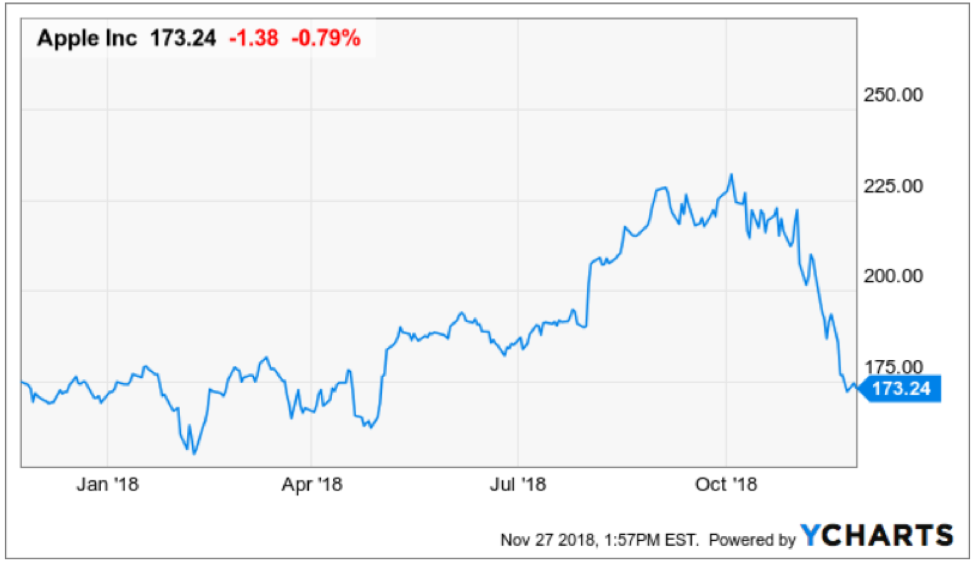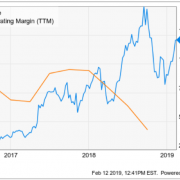Trump's Tariff Threat for Apple
The administration’s threat of levying 10% on iPhones is a great sign for the technology sector as a whole.
The short-term media sensationalism has flipped this story the other way around crying about this as if it is a major penalty to Apple (AAPL).
Don’t get me wrong, these potential stiff tariffs have the possibility of triggering a $1 billion loss on Apple’s revenue, but this is all about protecting American technology long term.
This is not like taking a sledgehammer and ruining their business model, and it will not strip away this brilliant wealth creation vehicle.
Apple remains a cheap stock to buy for patient long-term holders and is one of the best run companies in the world with an operating maestro executing the roll-out of premium products named Tim Cook, the CEO of Apple.
The administration might not like some of technology firms’ tactics, but in reality, they are a pivotal reason why the economy has been humming along in the longest bull-market ever.
Effectively, the administration has put Apple and its peers up on a pedestal and is defending them from Chinese competition.
What industry wouldn’t want this?
Most of 2018, the current administration presided over a stock market that was going up in a straight line and the bulk of those gains were harvested by the major tech companies, mainly the FANGs.
The administration was quick to take credit for a strengthening stock market and would like to see rates suppressed to engineer more upside.
The FANGs are going through a reversion to the mean after 100% gains and giving back 20% or 30% of profits offer opportune entry point for long-term investors.
The only FANG that needs a structural change is Facebook (FB) and has the funds to do it. The other three plus Microsoft (MSFT) will lead the tech charge when the short-term weakness subsides.
If you think Chinese consumers would bail on Apple products because of the trade war, then you are wrong.
Apple has been grandfathered into Chinese society and it is one of the few iconic American products that can boast this achievement.
Apple is a luxury brand produced by an epochal superpower.
The presence of Apple products reverberates around China’s economic landscape, and even if Chinese people do not like America, they respect its economic prowess and wish to learn from its capitalistic ways.
This is the main reason they send their kids to American universities.
Historically, China was once entirely dependent on Russia to fill in its economic and social vision with the communist party sending its best and brightest to Moscow to study the Soviet Union’s secret sauce.
If you go to Beijing now, most of the second ring road of flats conspicuously remind me of Khrushchyovkas, the unofficial name of a type of low-cost, concrete-paneled or brick three- to five-storied apartment building which was developed in the Soviet Union during the early 1960s.
During this time, its namesake Nikita Khrushchev directed the Soviet government.
Pre-Deng Xiaoping Soviet influences can still be found everywhere in central Beijing.
Once the Chinese communist government realized that the Soviet model impoverished large swaths of society, they went on the open market to find a more optimal method to run their economy that could take advantage of their monstrous man power.
The model they decided on was a fusion of communism and capitalism, and for 30 years, this system fueled Chinese peasants out of poverty and to the promenades of Saint-Tropez.
Because of Chinese laser-like obsession on social status, material possessions are the most important way for them to differentiate against each other.
For Chinese women, the x-factor is skin tone, but for Chinese men, it is the brand, quality, and volume of possessions.
Even if rich Chinese hate Apple and their iPhones, they are permanently married to this product because owning a Chinese smartphone would be a monumental faux pas on the same level as American First Lady Melania Trump shopping for her new clothes at Walmart (WMT).
This is the same reason why every political who’s who in China drives an Audi A6, and every successful Chinese business executive drives a BMW.
Luxury brands are closely associated to the person’s social status in China and these unwritten rules have even more weight than the official rules in China partly because most Chinese over 40 are uneducated, plus China’s lack of public trust.
Apple’s tentacles reaching deep into Chinese society have in fact led to a situation where Apple-related jobs for Chinese citizens add up to over 5 million jobs which is over double the number of jobs Apple supports in America.
The result of Apple morphing into a pseudo-Chinese company is that pain for Apple means a loss of Chinese jobs on a large scale at a time when the Chinese economy is becoming more precarious by the day.
The Chinese economy is softening under a massive burden of crippling public and private debt that is putting the cap on growth.
As a result of the trade skirmish, China has temporarily halted its deleveraging effort that was intended to remedy the health of the economy and has reverted back to the China of old, low-quality infrastructure projects and heavily polluted coal production.
China’s rapid ascent to prosperity could also mean the Chinese consumer and economy could go through a reversion to the mean scenario with private and public companies loaded to their eyeballs with debt going bust and a looming economic stimulus in the cards if this plays out.
All this means is that Apple is too big to fail in China and CEO of Apple Tim Cook absolutely knows this.
Theoretically, Chinese consumers absolutely have access to local smartphone substitutes for $200 that would do the same job as a $1,000 iPhone.
I have tested out Huawei and Xiaomi premium smartphones costing $400, and they have more than enough firepower to be a reliable everyday smartphone and some.
The fact is that Chinese consumers intentionally choose not to substitute Apple products.
And I would go deeper than that by saying Steve Jobs is revered in China like a demigod and his passing turned him into a sort of tech martyr with a level of status that not even Alibaba (BABA) originator Jack Ma can touch.
Jack Ma performed miracles by copying eBay’s (EBAY) blueprint of e-commerce from a shabby Hangzhou flat ditching his former job as an English teacher then copying Amazon (AMZN) to juice up growth.
But Jack Ma never created the iPhone, iPod, tablet, or Apple app store from thin air. That he never did.
Making matters even more ironic is that most Chinese communist members actually use an Apple iPhone for the same reasons I mentioned earlier.
Not only that, the children of Chinese communist politicians take lavish vacations to Silicon Valley to take selfie’s in front of Apple’s spaceship headquarters in Cupertino and upload them onto social media.
They then proceed to visit the nearest Apple store right next door at the Apple Park visitor center which is essentially an Apple store on steroids to make bulk purchases of Apple tablets, watches, computers, iPhones for their extended circle of friends and distant relatives because they are “cheaper in America than in China” mainly due to the heavy import duties levied on Apple products in China.
As for tech equities, what this does is blunt short-term positive sentiment for tech stocks and particularly chip stocks that I have told readers to stay away from like the plague.
Apple’s supply chain frenemies don’t have the luxury of selling 80 million luxury phones at $1,000 per quarter and are often the recipient of indiscriminate sell-offs shellacking shares.
Even with the overhanging issue of rising tariffs, tech stocks should produce great earnings next year.
Look at Apple and the consensus EPS outlook for next quarter comes in at $4.73 and that is after EPS increasing 41% sequentially from the quarter before.
Apple will soon become a $300 billion of sales per year company with profitability expanding at a rapid clip.
They are a company that prints money then buys back their own stock profusely. Not many companies can do that.
These negative reports that have been coming fast and furious don’t help the momentum, but the share’s weakness solely means that better entry points are available for investors before Apple launches over $200 again.
There is a high chance that the administration is using Apple as a bargaining chip and nothing will come of it.
Think about it, after all this commotion about the trade war with China, revenue was up almost 20% last quarter in greater China, so what gives?
It means that things aren’t as dire as it seems. A lot of hot steam over nothing is a gift to long-term investors, but short-term traders will feel the pain of the temporarily elevated headline risk.




